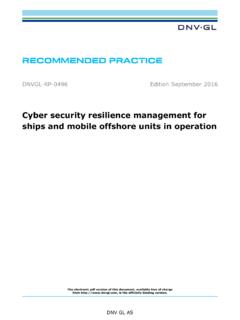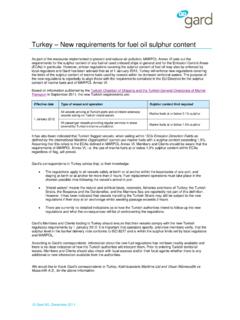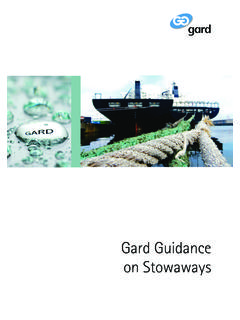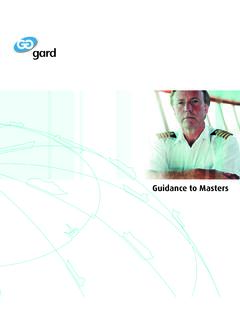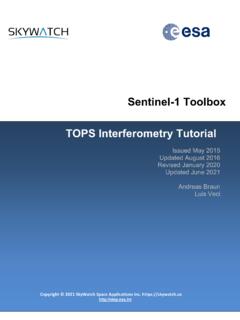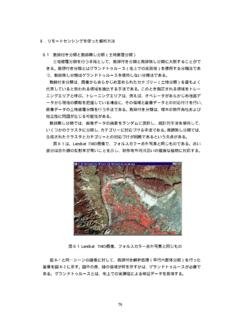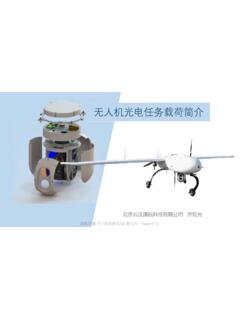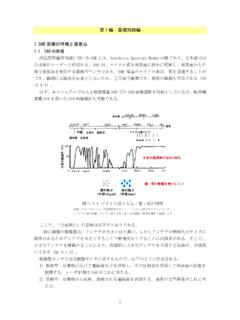Transcription of Sanctions – recent deceptive practices
1 1 Gard AS, Box 789 Stoa, NO-4809 Arendal, Norway Tel: +47 37 01 91 00, Fax: +47 37 02 48 10, Outside office hours: +47 90 52 41 00 For and on behalf of an entity of the Gard Group comprising, inter alia; Gard P. & I. (Bermuda) Ltd, Assuranceforeningen Gard - gjensidig - and Gard Marine & Energy Limited. Gard AS is registered as an insurance intermediary by the Norwegian Financial Supervisory Authority. Company Code : 982 132 789 Member Circular No. 12/2021 February 2022 Sanctions recent deceptive practices Introduction Since 2010, considerable Sanctions activity has been directed at shipping and its supporting industries reflecting the fact that 90% of world trade involves the carriage of goods by sea.
2 The purpose of this Circular is to draw Members attention to some of the recent deceptive practices employed by parties that are engaged in activities that offend the Sanctions regimes operated by national governments and or supranational bodies such as the UN. Current deceptive practices observed by the International Group and its commercial partners Whilst trade Sanctions are applied widely by governments to promote individual foreign policy objectives, the following jurisdictions are particularly relevant in the context of controlled activities in maritime trade: Iran Syria Venezuela Democratic Republic of Korea (DPRK) Crimea Cuba Cargoes traded in breach of international and national trade Sanctions appear to be on the increase.
3 Iranian oil exports, initially heavily restricted by Sanctions programmes are now thought to have risen from an estimated 340,000 barrels per day in following the US withdrawal from the JCPOA to an estimated million barrels per day in March In recent weeks oil swap deals involving Iranian and Venezuelan oil cargoes destined for Asian markets have been widely reported in the In September 2021 the United Nations Security Council Panel of Experts on DPRK published an interim report detailing widespread infringements of UN Sanctions involving shipping and the DPRK. Some of the techniques used to break Sanctions have been in use for several years, while others are newer and have become more prevalent in the last 18 months.
4 All aim to minimise surveillance and detection through confusion or concealment of the identities of vessels, their cargo, geographical location, and navigational activities. Such concealment poses risks for shipowners and their commercial partners who may inadvertently be employed to transport a sanctioned cargo. These techniques include: Manipulating a vessel s Automatic Identification Signal (AIS) to disguise the vessel s location and / or to alter a vessel s digital identity. Changing a vessel s physical appearance. Falsifying vessel and / or cargo documentation. Multiple ship-to-ship cargo transfers to hide the fact that the cargo originated in a country to which a Sanctions regime applies.
5 1 Iran Sanctions . Congressional Research Service. RS20871 2 Under US Sanctions , Iran, Venezuela strike oil export deal . Reuters 25 September 2021 2 Gard P&I Member Circular No. 12/2021, February 2022 Gard AS, Box 789 Stoa, NO-4809 Arendal, Norway Tel: +47 37 01 91 00, Fax: +47 37 02 48 10, Outside office hours: +47 90 52 41 00 For and on behalf of an entity of the Gard group comprising, inter alia; Gard P. & I. (Bermuda) Ltd, Assuranceforeningen Gard - gjensidig - and Gard Marine & Energy Limited. Gard AS is registered as an insurance intermediary by the Norwegian Financial Supervisory Authority. Company Code : 982 132 789 All these practices present risks for ship owners who without a properly implemented compliance framework may find that their vessel is being used to transport sanctioned cargoes.
6 AIS manipulation Considerable emphasis is placed by UN reports and the US and UK maritime advisories3 on the need to monitor the AIS transmissions of vessels as part of a properly implemented compliance framework. However, AIS technology and its associated hardware and software were not designed for this purpose; the purpose of AIS was to identify ships in coastal areas and minimise the risk of a collision. Since its function was to promote safety, it was not designed to prevent the signal it transmits from being manipulated and it remains lawful to switch the transmission off in the interests of vessel safety and The ability to manipulate or simply turn off the signal leaves AIS vulnerable to exploitation by those breaking Sanctions .
7 Although AIS transponders have built-in security features to prevent them from transmitting falsified data, these features are inconsistent across manufacturers and can be circumvented. Depending on the model, the encoded details can be changed using passcodes that are not always well-protected. In addition to directly tampering with the transmitter, a user can also purchase multiple AIS transponders and so create multiple digital AIS identities from a single vessel. Identity tampering and vessels disguising themselves physically and digitally is increasingly common. Current techniques include: 1. Switching off the AIS. Whilst switching off of an AIS transponder is permitted in certain circumstances by SOLAS, vessels engaged in Sanctions breaking can also switch off their transponders to hide their position and movements.
8 This practice remains common for less sophisticated sanction breakers who rely on legitimate excuses as to why a Master might choose to turn off the AIS transmitter and the fact that even a properly transmitted signal might not always be received. Members engaging in STS operations are therefore advised to monitor the providing vessel s AIS updates for gaps in transmission records. This can be achieved through an AIS monitoring platform or service provided by commercial companies where additional context and algorithms are used to assess whether an unlawful activity may have occurred during gaps in AIS transmission. In simple cases, operators may attempt to evade Sanctions by switching off AIS transponders when, for example, entering the Gulf of Oman and switching it back on after loading or conducting an STS of 3 To assist industry in their due diligence programmes, the US Department of State, the US Department of the Treasury s Office of Foreign Assets Control (OFAC), and the US Coast Guard published a Global Maritime Sanctions Advisory in May 2020, which provided compliance guidance to a range of marine-related sectors including shipowners, Flag Registries, Classification Societies, banks and insurance companies.
9 In July the same year, the UK followed suit with the publication by the Office of Financial Sanctions Implementation of its own Maritime Guidance to assist entities and individuals operating within the UK maritime shipping sector to better understand their compliance obligations. Both publications emphasised the importance of a comprehensive Sanctions compliance programme properly integrated into a business s operational practices . 4 Regulation V/19 of the International Convention for the Safety of Life at Sea (SOLAS), 1974, as amended, requires all ships of 300 gross tonnage and upwards engaged on international voyages, cargo ships of 500 gross tonnage and upwards not engaged on international voyages and passenger ships irrespective of size to be fitted with an automatic identification system (AIS), as specified in SOLAS regulation See paragraph 21 of IMO Resolution (22) which describes the circumstances when AIS may be disengaged.
10 A 917 22 ( ) . SOLAS V/34-1 The owner, the charterer, the company operating the ship as defined in Regulation IX/1, or any other person shall not prevent or restrict the master of the ship from taking or executing any decision which, in the master's professional judgement, is necessary for safety of life at sea and protection of the marine environment. 3 Gard P&I Member Circular No. 12/2021, February 2022 Gard AS, Box 789 Stoa, NO-4809 Arendal, Norway Tel: +47 37 01 91 00, Fax: +47 37 02 48 10, Outside office hours: +47 90 52 41 00 For and on behalf of an entity of the Gard group comprising, inter alia; Gard P. & I. (Bermuda) Ltd, Assuranceforeningen Gard - gjensidig - and Gard Marine & Energy Limited.
